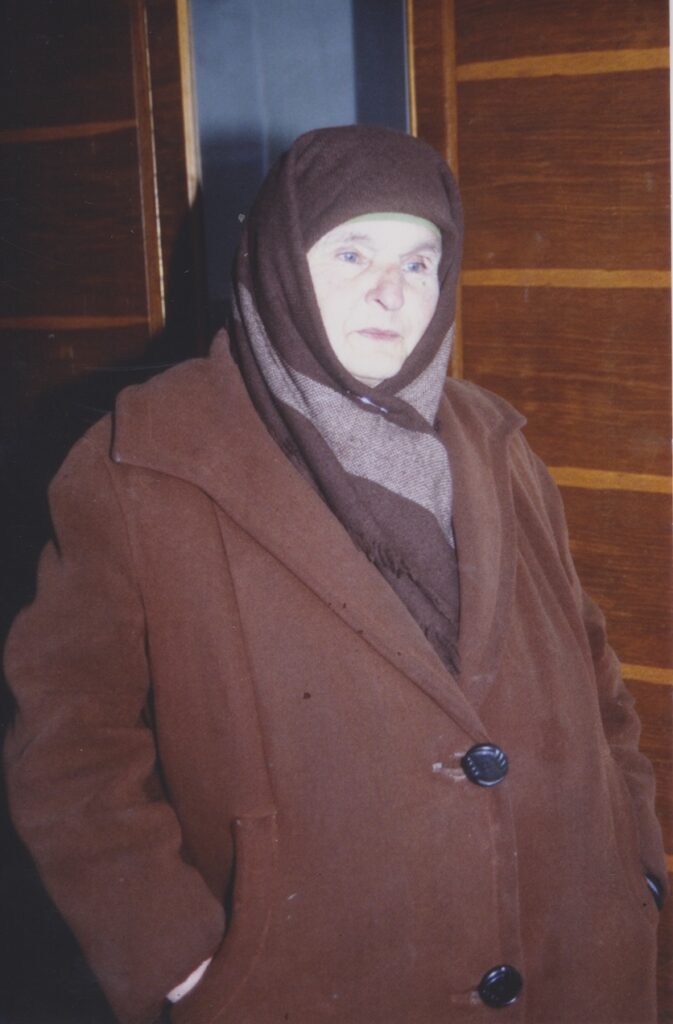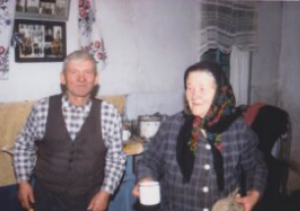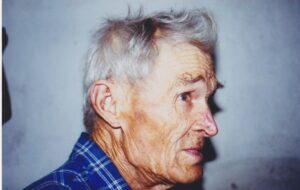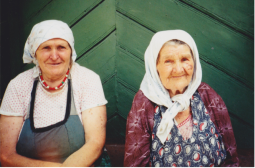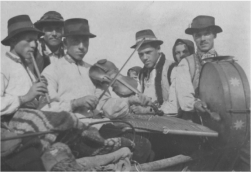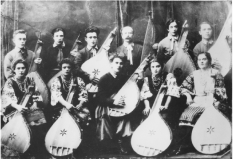Posobilova Oleksandra Ivanivna, b. 1917
Oleksandra Ivanivna Posobilova (Cherkasy region)
—Was your father a wheelwright or a cooper?
Oleksandra Ivanivna: There were wheelwrights, coopers, and potters.
—Who were more numerous: peasants who only farmed or those who farmed and had an additional trade?
Oleksandra Ivanivna: We had people who could do any job, and we had some lazy people. If one was lazy, he owned the land but did not work it. He didn’t have any cows or horses. It was very difficult to hire a horse in spring. Before the kolhosp, people lived well in our village. People mostly worked the land and grazed the cattle. When I was little, my father had sheep and pigs. We would graze them in the meadows or in the ravine.
…………………………………………………………………….
—Before the kolhospy, was there a mill nearby? What did the people in your village do besides farming?
Oleksandra Ivanivna: Some made wheels like my grandfather. He was one of the four brothers: Maksym, Yukhym, Pavlo, and my grandfather Petro. The four of them had five mills. My grandfather had two mills, and each of his brothers had one. This was before collectivization. Some people made wheels; others made wheel rims and sold them to the wheelwrights. We also had potters and blacksmiths. Prokip Mykhailovych Lavrynenko was a blacksmith. He didn’t want to join the kolhosp and continued working as a blacksmith; he was paid well.
Oleksandra Ivanivna Posobilova (Cherkasy region)
—Who was referred to as poor (bidniak)?
Oleksandra Ivanivna: I don’t know why there were poor. They never had a cow or a horse. They had large families and they or their children worked as hired workers.
—Did they work well?
Oleksandra Ivanivna: In their homesteads, the land was worked poorly. When the kolhosp began, seredniaky were not involved, but the kurkuli were humiliated and evicted. Their property was taken, and these bidniaky became the rulers then. They took the grain and the last bits of food from the kurkuli.
—Was this done by the poorest people?
Oleksandra Ivanivna: Yes. For some reason, they never had any pigs or horses. Either they didn’t have anything to start with or they were lazy.
…………………………………………..…..……………..…
—You spoke about your grandfather’s brother who was dispossessed? Was he exiled?
Oleksandra Ivanivna: The Soviet authorities did this is a very unfair way. They made provisions to establish the kolhospy—fine. What can one do? But they tortured the kurkuli a great deal. My maternal grandfather’s brother had two mills. My mother said they worked very hard: at night they would not sleep and think where to get more money to finish building the other mill—this was for the village, for the people. And what did they do to our grandfather Maksym? They threw him out of his homestead. His family was sent to the ravine; all my grandfathers used to work there digging dugouts. My grandfather Petro was not evicted from this large house because his son-in-law worked as a secretary at the village council and didn’t allow this. Grandfather Maksym’s cattle were confiscated and he was imprisoned. Then they saw that he was about to die and released him. He didn’t want to go back home and went to Cherkasy instead; it was difficult at the time to come back. As he was walking there, he died on the way, like that. They could have taken everything and left us just one cow and 0.7 hectares of land as was with us all, and let people live. They used to say that the kurkuli were causing some kind of harm. Maybe some of them did, but my grandfather worked like a slave. He only knew his homestead and his cow. That was all.
—What did people say about him?
Oleksandra Ivanivna: No one said anything. He wasn’t the only one who was evicted and deported. They only said that they were hard-working people and they got driven away.
Oleksandra Ivanivna Posobilova (Cherkasy region)
—Were there many people who didn’t join the kolhosp?
Oleksandra Ivanivna: Not many, but there were some. They didn’t live so well. Those who were in the kolhosp would go partying, singing, dancing after work; they had fun. Those who didn’t join the kolhosp locked themselves up in their houses and were sad. People would come to their houses they had locked the doors and didn’t let anyone in. I don’t approve of this. Even the Germans came and said, “Go work in the kolhosp.” The odnoosibnyky greeted them with bread and salt and said, “We didn’t work in the kolhosp.” They were beaten by whips. One had to work and not hide in the corners. Well, what can you do? Such was the system.
Oleksandra Ivanivna Posobilova (Cherkasy region)
—Did you perform for holidays or during skhodky?
Oleksandra Ivanivna: We played in the club on Saturdays or holidays. We were about fifteen musicians: four guitars, four balalaikas, four mandolins, and one fiddle. I learned all of them because I play all the instruments and the harmonia in addition. No one taught me. I learned on my own when my son brought me a harmonia three years ago. I was in the music school and elsewhere. We didn’t wait for Sunday. We played in the streets every night. The audience would come. People would sing and dance. One woman said, “When I die, I’d like you to play at my funeral all the way to the cemetery.” My second husband played harmonia. This was after the war because before the war my husband was a pilot; he died in 1941. He and I lived in Mongolia. When he died, I came to live here with my child.
Oleksandra Ivanivna Posobilova (Cherkasy region)
—What melodies did you play outside in the evenings?
Oleksandra Ivanivna: Ukrainian dances and songs: krakowiak, yabluchko, hopak, karapets, various polkas like “Marusia” and “Laughter.” I would say, “We’re going to play polka ‘Marusia’.” They would all tune in, and I’d take my fiddle and we’d start playing.
—When you played in the streets, did some musicians join you?
Oleksandra Ivanivna: No, we already had everyone we needed. If someone played the guitar, we’d check to see if he was a good match for us. It’s important to be in-tune in music, just like in singing. I would check the pitch, and we’d start playing.
—Were you asked to play at weddings?
Oleksandra Ivanivna: Rarely. When I was married, my husband played harmonia, and I played fiddle. We did a good job together. We used to go to other villages to play.
—Did you play in the clubs?
Oleksandra Ivanivna: Yes, we gave paid concerts.
—Did you get money for this?
Oleksandra Ivanivna: Maybe they gave us money, but the guys would buy half a liter [of vodka] and drink it after the concert.
Oleksandra Ivanivna Posobilova (Cherkasy region)
—Were there any startsi who played the lira (hurdy-gurdy)?
Oleksandra Ivanivna: Not in our village. I’ve heard that there were some at the markets.
—If they were at the market, what melodies would they usually play?
Oleksandra Ivanivna: The beggars played on the market, earning their living. They played sad songs, mostly Ukrainian, but at the time they would play both Ukrainian and Russian songs. Of course, they played the folk songs. I lived in Kazakhstan during the war, and one day I went to the market where a starchykha played and sang “In the garden by the valley” [V sadu pry dolyni].
—What did she play?
Oleksandra Ivanivna: Harmonia.
—Was she blind?
Oleksandra Ivanivna: I think so.
—Where was this?
Oleksandra Ivanivna: In Semipalatinsk. My husband left the military town called Sokondok. Sokondok station was about three kilometers away. When he left for war, I flew to his sister in Omsk, and then my aunt flew from Dnipropetrovsk to Kazakhstan. Her husband worked in the NKVD. Women were evacuated, and she ended up in Semipalatinsk. She invited me to come there, and I left on November 17.
Oleksandra Ivanivna Posobilova (Cherkasy region)
—Why is the club closed?
Oleksandra Ivanivna: Because the people are used to it being closed. No one is forcing them. There’s no one who can work with the choir; maybe someone would want to, but there are no singers. There are no young people, and the older ones don’t want to go. It’s been closed for a year. No one went to the club for a year, but they keep getting paid. The regional administration pays them, and they report that they do the work. Why?
